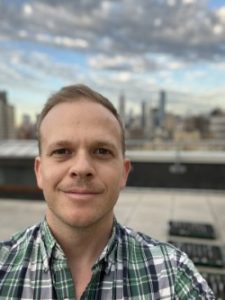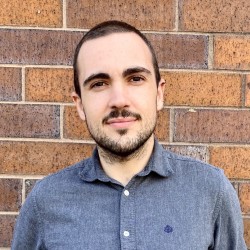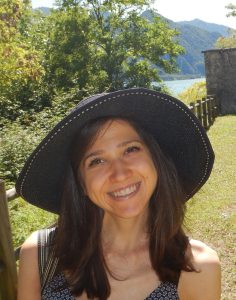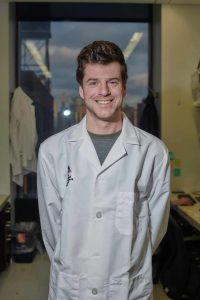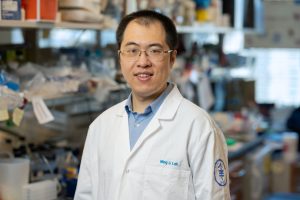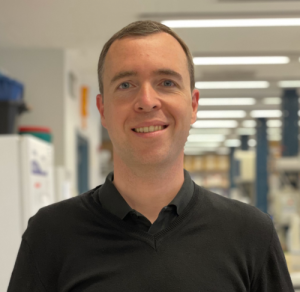The Biomedical Research program is devoted to strengthening experimental basic research in the biomedical sciences. Revson provides two kinds of fellowship awards to exceptionally talented scientists.
Each year, the Charles H. Revson Senior Fellowship in Biomedical Science is offered competitively to eight outstanding researchers in their third or fourth years of postdoctoral studies at participating New York Metro area research institutions.
We also support the Weizmann Institute of Science’s Postdoctoral Program for Advancing Women in Science, which provides supplementary financial support to Israeli women scientists who have already been awarded postdoctoral fellowships by prestigious institutions in North America.
View All Biomedical Research Grants
Featured Project: Spotlight on the Revson Fellowship class of 2024-2026
Please welcome our Revson Fellowship class of 2024-2026!
Lucas Henry – New York University
Lucas’s research broadly focuses on evolutionary processes in complex systems. He currently investigate how host-microbiome interactions influence pathogen evolution. He received undergraduate degrees in biology and bassoon performance from Bard College, an MS in biology from Indiana University, and a PhD in ecology and evolutionary biology from Princeton University.
“Why did you want to become a scientist and when did you know this was your path in life?”
In my first semester as an undergraduate, I wanted something to do that was outdoors-y, and I saw an opportunity to get involved in ecological research. I had no idea what research would be like, but through the guidance of my fantastic undergrad advisor, I was shown how the biological world is a series of interacting pieces, where seemingly small players can have large impacts on the big picture. I was entirely captivated by this and the potential to make discoveries about the natural world. After a few years as a research technician, the joy and excitement from designing experiments to solve challenging problems in biology never went away, and I knew that I wanted to pursue a career in research.
Alberto Jesus González-Hernández – Weill Medical College of Cornell University
Alberto earned a BSc in Biology and an MSc in Biomedicine from the University of La Laguna (Spain), where their fascination with the brain’s bioelectrical signaling began. His PhD research in Neuroscience focused on the regulatory interaction between a voltage- and calcium-activated potassium ion channel and its different calcium sources. His work deepened his interest in the complexity of neuronal protein networks and the importance of studying them within their unique functional contexts. In Prof. Joshua Levitz’s lab, he study the signaling, desensitization, and neuromodulation of metabotropic glutamate receptors (mGluRs), currently focusing on identifying key proteins involved in mGluR-mediated presynaptic long-term depression. To achieve this goal, he utilize various techniques, including electrophysiology, photopharmacology, imaging, and proximity proteomics.
“Why did you want to become a scientist and when did you know this was your path in life?”
As stereotypical as it might sound, I’ve been captivated by science since I was a child. I vividly remember asking my parents for books on scientific topics that were often beyond my age, particularly in biology and physics. My interests were broad but focused, and I naturally gravitated toward exploring these subjects. I wouldn’t say there was a single moment when I knew this would be my path; rather, it felt like a gradual, inevitable progression that evolved naturally from an early age.
Silvia Benito Kwiecinski – Memorial Sloan Kettering Cancer Center
Silvia’s research investigates the mechanisms that regulate the remarkably slow maturation of human neurons compared to other mammals. By developing novel human-mouse hybrid models of neurodevelopment, she aims to illuminate how species-specific transcriptional networks and environmental factors influence the tempo of neuronal maturation, with implications for evolutionary biology and disease modeling. She holds a BSc in Biomedical Sciences with Honours in Neuroscience from the University of Edinburgh and earned her PhD in Biological Sciences from the University of Cambridge, where she conducted research under the supervision of Dr. Madeline Lancaster at the MRC Laboratory of Molecular Biology (LMB).
“Why did you want to become a scientist and when did you know this was your path in life?”
Curiosity has always been my driving force. As a child, I would spend hours observing ants and was captivated by nature documentaries, marveling at how different species evolved such complex specialized behaviors to survive. This early fascination with behavioral diversity grew into a deeper scientific curiosity about the organ orchestrating it all – the brain. During my Neuroscience-focused undergraduate studies, I became increasingly interested in developmental neurobiology and the early differences that result in such vast variations in brain size and function across mammals. I was excited to discover we could model and functionally interrogate human brain development using stem cells, and knew I wanted to pursue a career studying human-specific features of neurodevelopment.
Giulia Gennari – New York University Grossman School of Medicine
Giulia obtained her B.Sc. in Psychobiology and her M.Sc. in Neuroscience from the University of Padua, Italy. After a period as a research assistant in Dr. Floris de Lange’s lab at Donders Institute in the Netherlands, she joined Dr. Ghislaine Dehaene-Lambertz’s team within the Cognitive Neuroimaging Unit (UNICOG) of Neurospin in France. There, she employed high-density EEG to reveal the representational primitives used by the human brain at the very beginning of life, completing her Ph.D. in Cognitive Neuroscience in December 2021. Since 2022 she has been a postdoctoral fellow in Prof. Biyu He’s lab at the Neuroscience Institute of NYU. Her current research focuses on the temporal structure underlying perceptual awareness. Using Magnetoencephalography and intracranial EEG, she seeks to uncover the temporal organization of brain activity that drives the updating of conscious contents.
“Why did you want to become a scientist and when did you know this was your path in life?”
I was an overly curious toddler who grew into an overly curious child who grew into an overly curious teenager. Finally, as a young adult attending the first year of university, I came to a fundamental realization: nothing could captivate or fuel my curiosity more than the human brain. Whereas asking questions has always come naturally to me, it was during my first internship at the Erasmus Medical Center in Rotterdam (NL) that I fell in love with the scientific method – formulating hypotheses, crafting experiments, and generating high-quality data to uncover the most reliable answers. From that point forward, my purpose was clear: to pursue neuroscience research in hopes of contributing even a small but meaningful insight to humankind’s understanding.
Jeffrey Downey – Icahn School of Medicine at Mount Sinai
Dr. Downey’s research looks to better understand how respiratory infections like those caused by influenza viruses can damage the heart and increase cardiovascular disease risk and severity. He performs his research in the laboratory of Dr. Filip Swirski, which he joined in February of 2021. Previously, Dr. Downey obtained his BSc in Physiology and his PhD in Pathology from McGill University in Montreal, Canada. There, he focused on host defense to the pulmonary pathogens influenza A virus and Mycobacterium tuberculosis.
“Why did you want to become a scientist and when did you know this was your path in life?”
I never necessarily knew that science could or would become my career, but I have always been fascinated by the basic workings of the body during both health and disease. As I continued studying biology, I grew more and more engrossed and kept finding new opportunities to follow that passion. Ultimately, I ended up researching full time and contributing studies to our collective knowledge and I couldn’t be happier!
Zijian xu – Memorial Sloan Kettering Cancer Center
Zijian’s project focuses on studying how tissue-resident lymphocytes contribute to preventing ovarian cancer relapse. The goal is to develop new therapies to improve survival rates for ovarian cancer patients. He received a B.S. in Biological Science from China Agricultural University and later earned his PhD from the National Institute of Biological Sciences, Beijing.
“Why did you want to become a scientist and when did you know this was your path in life?”
Curiosity was my original motivation for entering the world of science. When I was a child, I was interested in the regional differences in the body, such as why hair mainly grows on the head while being sparse on other parts. These differences inspired me to believe that there are fundamental principles underlying highly complex living beings, and I wanted to uncover some of those principles myself.
At the PhD stage, I discovered that anatomically distinct fibroblast subsets determine body regional patterns in the autoimmune skin disease vitiligo. This discovery inspired me to pursue postdoctoral training and join Dr. Ming Li’s Lab at MSKCC. My postdoctoral project focuses on exploring immunosurveillance mechanisms that establish organ-specific metastatic patterns during ovarian cancer relapse and discovering new therapeutic strategies to treat metastatic ovarian cancer
Mathieu Rouanne – Columbia University Medical Center
Mathiew is a physician-scientist trained in surgery (M.D.) and cancer immunology (Ph.D.) at the University of Paris. His scientific research has focused on bladder cancer immunology and immunotherapy. He is currently an associate research scientist in the laboratory of Dr. Nicholas Arpaia in the Department of Microbiology and Immunology at Columbia University Irving Medical Center (CUIMC). His project aims to evaluate a novel therapeutic approach using engineered bacteria in preclinical mouse models of bladder cancer. His overarching goal is to translate discoveries in human cancer immunology into innovative therapeutic approaches for bladder tumors.
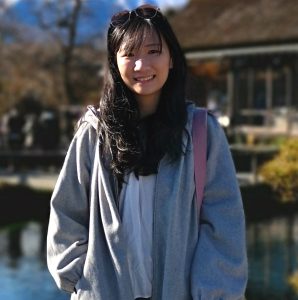
Qianyi Wu – Weill Medical College of Cornell University
Dr. Wu received her Bachelor of Science (Honours, First Class) degree in 2017 and her PhD in 2021, studying how the glutamate transport and chloride channel activity are functionally and structurally integrated within the SLC1 transporters, with a focus on their physiological relevance under pathological conditions at the University of Sydney, Australia. She joined the Boudker Lab at Weill Cornell Medicine as a postdoctoral scientist in June 2021, where she further extended her skill set to various biochemical and biophysical approaches, including Single-molecule fluorescence resonance energy transfer (smFRET) and Cryo-electron microscopy (CryoEM), exploring the mechanistic relation between the conformational dynamics, atomic structures, kinetics, and pathology of membrane proteins.
“Why did you want to become a scientist and when did you know this was your path in life?”
When I was younger, I became aware of the many gaps in medical research, especially as friends and family members struggled with neurological disorders and cancer. At the time, I didn’t realize I could contribute to this field. However, during my undergraduate years, I had my first experience in a research lab. That moment sparked my curiosity and passion for science, and as I developed new skills to solve complex problems, my enthusiasm only grew. The joy I found in this work made me eager to dedicate a significant part of my life to it.

